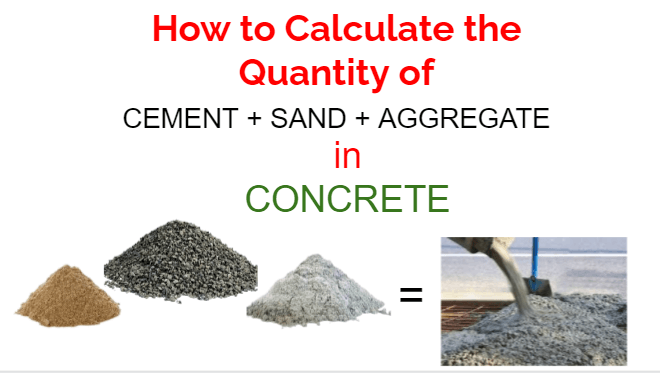Table of Contents
In this article, we will discuss How to calculate cement sand and aggregate in concrete.
1. Introduction
Concrete is the composite material that is composed of a mixture of fine and coarse aggregates bonded together with biding material which hardens over time. The binding material mostly includes fluid cement paste, lime putty, lime, etc. In simple language, Concrete is a mixture of cement, sand, aggregates, and water.

2. Calculate Cement Sand and Aggregate in Concrete
The density of Cement = 1440 kg/m3
The density of Sand = 1450-1500 Kg/m3
The density of Aggregate = 1450-1550 Kg/m3
Weight of Cement in 1 Bag = 50 Kg
The volume of 1 Bag Cement in Cubic meter = 0.03472 m3
The volume of 1 Bag Cement in ft3 = 1.266 ft3
Numbers of Cement Bags in 1 m3 = 28.8
How many ft3 in 1 m3 = 35.31 ft3
3. Considering M15 Grade Concrete
Cement may be prescribed as a material with adhesive and cohesive properties which make it capable of bonding mineral fragments into a compact whole.
Grade of Concrete = M15 Concrete
Mix Ratio = 1:2:4
Total sum of ratio =1+2+4 =7
Wet volume of concrete = 1 m3.
To get dry volume, wet volume increased by 54%
Dry volume of concrete = 1 + 0.54
Dry volume of concrete = 1.54
4. Volume Increased by 54%
The reason behind the volume increase by 54% is dry aggregate, sand and cement have air voids. Dry aggregate has 33 to 34% air voids, whereas sand contains 20% air voids and cement has very fine particles hence it has negligible are voids so we can neglect it.
Now the total number of the air voids of sand and aggregate that result in 20% +34% = 54%. so this is the reason we have to sum 54% for wet to dry volume of materials.
Quantity of Sand in kg = 0.44 × 1450 (density of sand = 1450 to 1500 kg/m3)
Quantity of Sand in ft3 = 1.54 / 7 × 2 × 35.314 (1 m3 = 35.314 ft3 )
= 15.53 ft3
Alternative way,
Quantity of Sand in ft3 = Nos of cement bags x Volume of one bag cement in ft3 × Ratio of sand
= 6.336 × 1.226 × 2
= 15.53 ft3
5. Quantity of Aggregate
Aggregate is a collective term for the mineral materials such as gravel, sand, and crushed stone, which are used along with binding materials such as bitumen, cement, lime, etc to form compound materials.
Quantity of Aggregate in m3 = 1.54 / 7 × 4 (where 4 is the ratio of aggregate)
= 0.88 m3
Quantity of Aggregate in kg = 0.88 × 1500 (Density of Aggregate = 1450 to 1550 kg / m3 )
= 1320 kg
Quantity of Aggregate in ft3 = 1.54 / 7 × 4 × 35.314
= 31.07 ft3
Alternative way
Quantity of Aggregate in cubic feet = Nos of cement bags × Volume of one bag cement in ft3 × Ratio of aggregate
= 6.336 × 1.226 × 4
= 31.07 ft3
6. Quantity of Water
Take water-cement ratio = 0.45
Water requirement for 1 bag cement = 0.45 x 0.0347 (Volume of 1 bag cement = 0.0353 m3) = 0.0156 m3
1 m3 = 1000 liter
Water requirement for 1 bag cement = 0.0156 × 1000
= 15.6 litres
Water requirement for 6.336 bag cement = 6.336 × 15.6
= 98.93 litres
7. Conclusion
For M 15 grade concrete (1:2:4)
Cement = 6.336 bags
Sand = 0.44 m3
Aggregate = 0.88 m3
Water = 98.93 litres
Similarly, we can calculate the number of materials for different mix ratios.
In this way. you can calculate cement sand and aggregate in concrete of any grade.
| Read Also: How to Calculate Number of Bricks Single |

